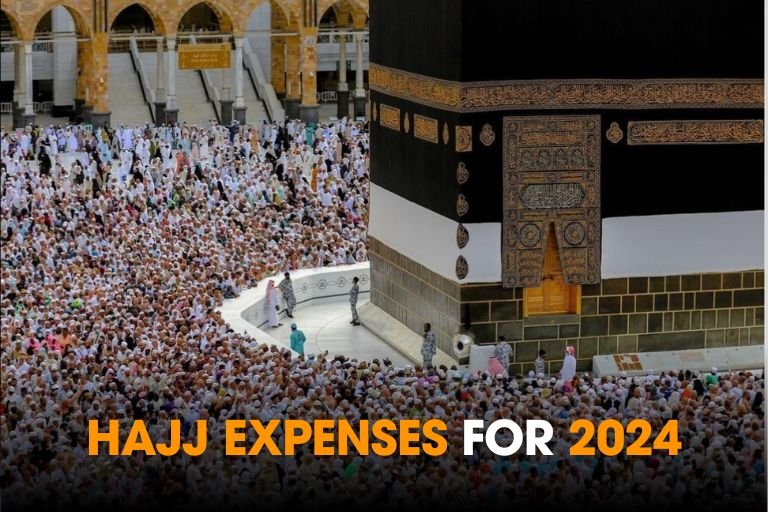The Hajj, also known as the pilgrimage to Mecca, represents the highest point of Muslim belief, a transforming journey unlike any other. While the spiritual reward is indescribable, understanding the financial aspects of this journey is important for responsible planning. In this comprehensive guide, we look into Hajj expenses for 2024, offering insights into costs, factors influencing them, and tips for budgeting effectively.
Table of Contents
Understanding Cost Variations:
The total cost of Hajj can vary significantly based on several factors, including:
- Country of residence: Government subsidies, exchange rates, and travel packages affect the overall cost.
- Accommodation type: Options range from basic shared camping to luxurious hotel suites, strongly impacting the price.
- Flight preferences: Airline choices, stopovers, and travel class influence airfare.
- Length of stay: choosing the fewer-day “Short Hajj” package results in additional costs.
- Personal expenses: Gifts, souvenirs, and dietary preferences contribute to individual spending.
Estimated Costs for 2024:
While prices can change slightly, here’s a general breakdown of Hajj expenses for 2024:
- Government package:
- India: INR 399,500 (minimum)
- Pakistan: $3,800 (estimated)
- Saudi Arabia: SAR 85,000 (estimated)
- Private packages: Prices can range significantly, starting from around $4,500 and exceeding $10,000 depending on the features and services.
Budgeting Tips for a Financially Wise Hajj:
- Start saving early: The earlier you start saving, the easier it is to manage monthly installments or one-time payments.
- Research and compare packages: Choose an option that matches your budget and comfort level.
- Consider subsidized government packages: Many countries offer subsidized Hajj packages, making the journey more affordable.
- Plan travel dates strategically. Booking flights and accommodations during off-peak periods can lead to big savings.
- Pack smartly: Minimize luggage to avoid excess baggage fees, and stick to a moderate amount of personal spending.
- Look for financial assistance. Explore scholarship programs or community fundraising initiatives to ease the financial stress.
Navigating Visa and Documentation Costs
Unveiling the Visa Landscape
The cost of applying for a Hajj visa varies depending on your nationality and location. Generally, expect to pay between US$300 and US$500 for the official Hajj visa itself. However, there might be extra charges and additional requirements.
- Manasik Fee: The Kingdom of Saudi Arabia charges a non-refundable Manasik fee, which contributes to pilgrim services and facilities. In 2024, this fee is expected to be around US$200–US$300.
- Biometric Registration: Some countries require pre-departure biometric registration, paying additional fees that range from US$50 to US$100.
- Medical Certificates: Getting mandatory vaccinations and health certificates can involve varying costs, depending on your local healthcare system.
Essential Documents and Their Costs
Beyond the visa, make sure you have everything in order for a smooth pilgrimage experience:
- Valid Passport: A valid passport with at least six months of extra validity is mandatory. Renewal fees and rapid processing costs vary by country.
- Mahram Documentation: Female pilgrims under 45 years old must travel with a male Mahram (close relative). Proof of this relationship may be required and subject to specific fees.
- Proof of Vaccination: Provide documentation for mandatory vaccinations as required by the Saudi Arabian Ministry of Health. Additional fees may apply for vaccine administration, depending on your healthcare system.
- Travel Insurance: While not mandatory, comprehensive travel insurance is highly recommended for peace of mind. Costs vary based on coverage and providers.
Beyond the Cost:
While understanding Hajj expenses is important, remember that the financial aspect is only one aspect of this sacred journey. Focus on your spiritual intentions, delve into the rich rituals, and connect with other pilgrims from around the world. Let the financial planning clear the way for a fulfilling and transformative Hajj experience.
Additional Resources:
- Hajj Committee of India
- Ministry of Religious Affairs and Spiritual Harmony, Pakistan
- General Administration for the Affairs of the Two Holy Mosques
- Hajj Guide 2024 by the Ministry of Hajj and Umrah
- Hajj Expenses Estimator Tool (varies by country)
FAQs: Frequently Asked Questions
1. Can I get financial assistance for Hajj expenses?
Financial assistance for Hajj depends on your location and conditions. Some governments offer subsidies or scholarships, while charities and community organizations may also provide assistance. Explore options through your local religious authorities, Hajj committees, or nonprofit organizations dedicated to supporting pilgrims. Remember, early planning and looking for guidance can increase your chances of securing assistance for this sacred journey.
2. What are some cost-effective travel strategies for Hajj 2024?
Book early, compare packages, choose off-peak dates, pack light, consider government subsidies or fundraising, and prioritize spiritual focus over luxury.
3. Are there insurance options for unexpected costs during Hajj?
Yes, some travel insurance plans offer Hajj-specific coverage for unexpected medical needs, missed flights, or baggage issues. However, they often exclude religious rituals and pre-existing conditions. Research carefully and compare coverage before purchasing to ensure it matches with your specific needs and Hajj schedule.
4. How can I budget for health-related expenses during Hajj?
Pack travel insurance, research free clinics, budget medications, prioritize necessary items, and pack first-aid supplies.
5. Are there affordable accommodation options for Hajj pilgrims?
Absolutely! Hajj offers a range of hotel options, from budget-friendly tents near the Haram to comfy hotels further out. Early booking and considering fewer peak seasons can score great deals. Good luck on your journey!





Pingback: Top Secret!🤫 The Easiest Way to Get a Saudi Visit Visa from India 2024
Pingback: Visiting Masjid Quba, the First Mosque: A Guide for Muslim Travelers
Pingback: 5-Star Hotels in Mecca Offering Comfort and Convenience for Hajj or Umrah